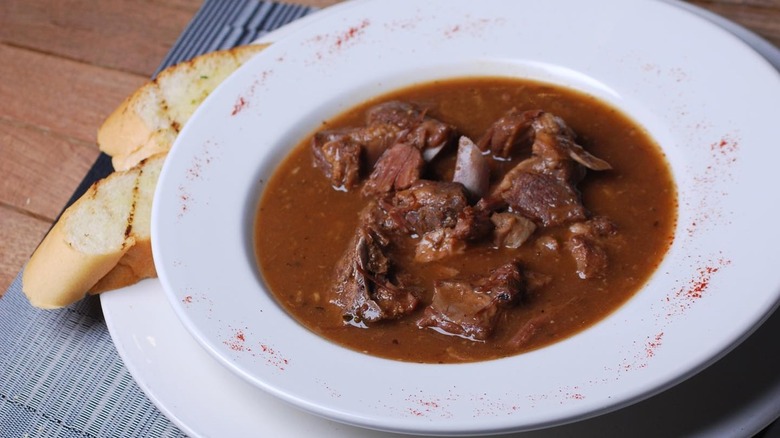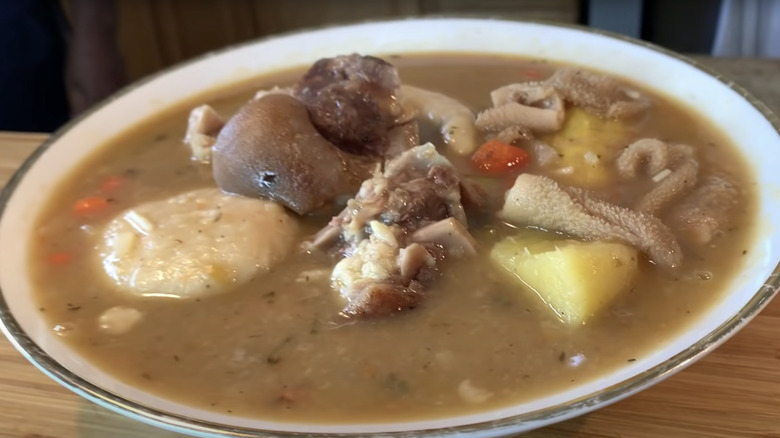What Exactly Is Goat Water And What Does It Taste Like?
No, they didn't find a way to squeeze water out of goats, although that would be quite interesting. Goat water is actually a type of stew and the national dish of Montserrat. The British overseas territory, located southeast of Puerto Rico in the Lesser Antilles chain of Caribbean islands, has a population that barely tops 5,000, but its culinary offerings are among the most unique on Earth, born from a complicated collision of Caribbean, English, Irish, and African cultures. No dish better exemplifies this melting pot model than goat water.
Goat water, also known as kiddy stew, contains slow-cooked cubes of goat meat with onions, and green peppers. These ingredients are simmered in a meaty broth that's neither too thick nor too thin — about the consistency of cream. The slightly gamey taste of goat is elevated by a blend of herbs and spices.
The most widely-circulated recipe for goat water comes from The Montserrat Cookbook released by the local Old People's Welfare Association. First published in 1969, the recipe calls for garlic, cloves, marjoram, and mace (a derivative of the nutmeg fruit), and suggests adding a splash of rum or whiskey at the end. Scotch bonnet chile pepper, one of the defining flavors of the Commonwealth Caribbean, is a very common addition that lends some serious heat to the dish. With its bold, spicy flavor profile, goat water seems like a far cry from the stew that originally inspired it, but that's all part of the dish's fascinating backstory.
The multicultural history of goat water
It makes sense that goat water is the national dish of Montserrat, as its origins tell the story of the island itself. The earliest residents of Montserrat were the Saladoid, Arawak, and Caribs, but they abandoned the island by the time Christopher Columbus caught a glimpse of it on his second voyage to the Americas.
Montserrat was ultimately colonized by Europeans in a rather unusual way. As the British established colonies throughout the Caribbean, they brought with them many Irish indentured servants, including to the nearby island of Saint Kitts. In 1632, the British governor of Saint Kitts banished all Irish people from the island, and they subsequently moved to Montserrat. More Irish came later by way of Virginia, fugitives from indentured servitude, and by 1678, a full 70% of Montserrat's population was of Irish origin, earning it the nickname "Emerald Isle of the Caribbean."
This wave of immigration brought a particular dish to the shores of Montserrat: Irish stew. The dish is traditionally made with lamb meat, but this was ultimately replaced by goat. Goat meat is a significant part of many Caribbean cuisines, as highlighted by Jamaica's famous curried goat. Between the 1660s and the 1830s, thousands of African slaves were also forced to Montserrat, exerting further influence on the development of goat water, which drifted further and further from its Irish ancestor with the addition of local ingredients like the Scotch bonnet.
Variations of goat water can be found throughout the Caribbean
Goat water certainly holds a special significance to Montserrat — it's the island's national dish after all — but it is also extremely popular on other Caribbean islands with a history of British colonialism. Variations of goat water can be found on tables in Antigua, Grenada, and Saint Kitts and Nevis. However, the most notable take on goat water comes from Jamaica, where it is known as mannish water. Like Monsterrat's goat water, mannish water uses any available parts of the goat, and gets a boost of flavor from Scotch bonnet peppers and rum. It differs from the Montserratian version in the addition of root vegetables like potatoes, carrots, and yams.
Mannish water has a pretty bawdy reputation. It is often served at social gatherings, but especially at weddings, where it serves a particular purpose for the groom. Mannish water is said to be an aphrodisiac, and even capable of certain male enhancements. There are varying accounts that both support and counter this claim, but there's one thing everyone seems to agree on: It's a darn tasty stew.


